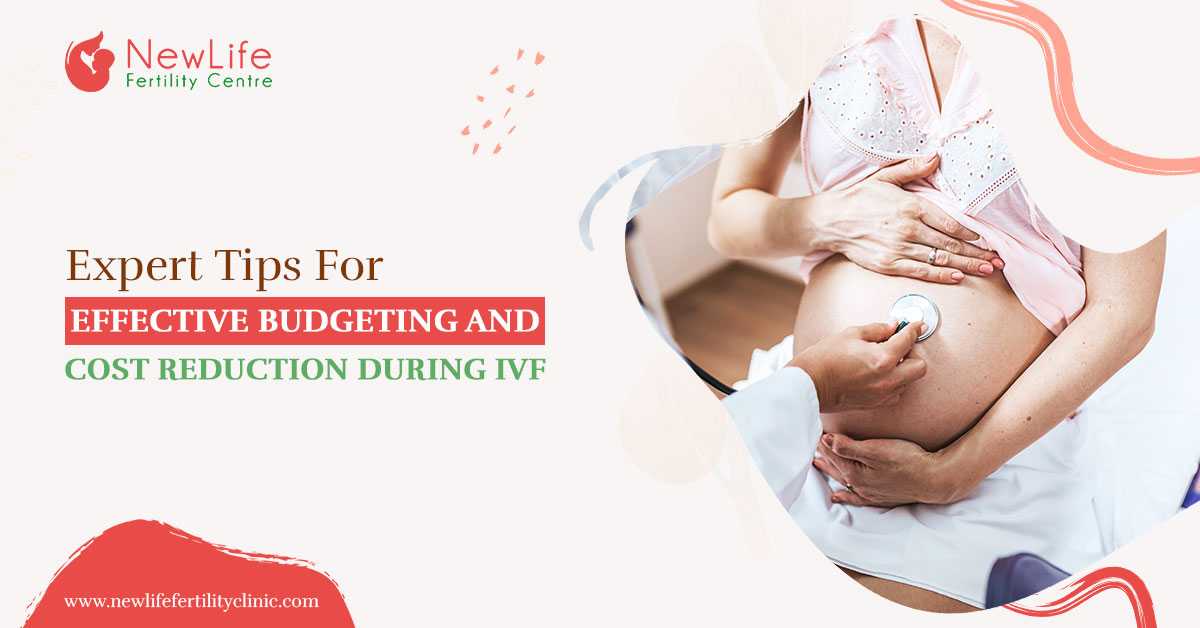1. Introduction
For infertile couples, in-vitro fertilization (IVF) is a game-changer that gives them hope to enjoy the joy of parenthood when earlier approaches may have failed. The financial commitment required for IVF frequently makes the procedure even more stressful, even though it can be an emotional rollercoaster. The cost of consultations, prescribed medications, and IVF steps can mount up rapidly, raising questions about affordability. However, IVF can become an affordable goal with the right knowledge and financial planning.
Purpose:
This elaborative guide offers all the necessary information on how to do budgeting for IVF treatment, including how to calculate costs, look into funding possibilities, and maximize spending. Couples can reduce their financial stress and concentrate on the journey ahead by approaching IVF treatment with a clear financial strategy. Let's delve deeper and offer you the required information about the IVF treatment costs in India so that you can effectively budget for your treatment.
2. Understanding IVF Costs
Numerous factors might cause the cost of IVF therapy in India to vary greatly. IVF cycles in India typically cost between ₹1, 50,000 and ₹2, 50,000. This range might vary based on the clinic, location, and extra procedures needed. You need to consider these factors while budgeting for IVF treatment.
IVF cost breakdown:
- Consultation Fees: The average cost of a consultation with a fertility specialist is between ₹500 and ₹2,000. The overall cost will increase depending on how many consultations are needed before IVF begins.
- Medications: Depending on the kind of drug and dosage required, IVF can cost anywhere from ₹15,000 to ₹70,000 per cycle. It uses hormone injections and other drugs to induce ovulation.
- Egg Retrieval and Embryo Culture: The entire process, which includes fertilization, egg retrieval, and embryo culture, usually costs between ₹50,000 and ₹1, 00,000.
- Embryo Transfer: An amount of ₹15,000 to ₹30,000 may be needed for the actual transfer process.
- Pre-implantation genetic diagnosis (PGD) and intracytoplasmic sperm injection (ICSI): These extra procedures, which are frequently advised in situations of male infertility or genetic concerns, can raise the cost by ₹50,000 to ₹1, 00,000.
Variations in costs across regions
IVF treatment prices are often lower in smaller towns and rural areas than in major cities like Delhi, Mumbai, or Bangalore. Higher operating costs, improved infrastructure, and a rise in the need for specialized services in urban areas are the causes of this. For instance, if you see the IVF cost in Siliguri then the range is between Rs. 60, 000 and Rs. 1, 00,000. On the other hand, this range increases to Rs.1, 00,000 to Rs.1, 50,000 for IVF treatment in Delhi. Therefore, if you’re looking for affordable IVF options then choosing a small town is better.
Factors that influence pricing
The overall IVF treatment cost in India might vary depending on a number of factors, including age, medical history, and extra procedures like ICSI or PGD. When considering the financial commitment involved, it's important to take into account all these components of the treatment because advanced procedures or several cycles may add significant expenses.
3. Researching Affordable IVF Centres
Choosing the appropriate clinic is one of the first stages in organizing IVF finances. Cost is a significant consideration, but affordability and quality must be balanced. Here are some tips for selecting reasonably priced IVF centres:
- Examine and contrast clinics: Examine several clinics that fall within your price range. Examine patient testimonials, success rates, and treatment expenses to choose the most affordable IVF options. Make sure the clinic has clear pricing and doesn't conceal any additional costs that might come as a surprise.
- Fee Transparency: Select clinics that offer a detailed explanation of all related expenses, such as consultations, prescribed medicines, procedures, and any extra treatments.
- Financial Assistance Programs: To make treatment more accessible, several clinics provide payment plans or financial aid. For managing IVF expenses, find out whether there are any discounts, special deals, or payment plans available.
Make sure to inquire about any government-funded or non-profit programs that many fertility centres have partnerships with to help reduce the overall IVF treatment costs in India for people who are struggling financially. NewLife Fertility Centre can be one of the best options if you’re selecting an affordable IVF centre that provides quality treatment and high success rates.
4. Budgeting for IVF Treatment
Managing IVF expenses requires careful financial planning. This is a detailed guide that includes IVF financial planning tips:
- Assess current savings and potential costs: Start by assessing your existing financial status. Examine your income and expenses, as well as your savings, especially any emergency money. Next, determine how much IVF treatment will cost, including the consultations, medications, the process, and any extra procedures. Given that many couples need more than one IVF attempt, be prepared for several cycles if needed.
- Establish reasonable deadlines for savings: Make a plan to increase your savings if you don't have enough already. Take into consideration your monthly expenses as well as any compromises you might need to make in order to save efficiently. This is one of the most essential IVF financial planning tips where you need to set aside a decent amount of money for the treatment.
- Create a contingency fund: IVF occasionally needs various cycles or additional procedures. While budgeting, it is crucial to have a contingency fund of 10%–20% of the decided IVF treatment cost in India in order to cover unforeseen expenses.
You'll be more financially prepared for the IVF process and less stressed by unforeseen expenses if you have a defined budget and timeframe.
5. Exploring Financing Options
To assist couples in covering the cost of IVF treatment, a number of funding solutions are available-
a. Medical Loans and EMI Options
Numerous banks provide medical loans intended especially for reproductive treatments. These loans cover the cost of your IVF procedure upfront and can be paid back in convenient monthly installments (EMIs). Medical loans provide the benefit of covering the full cost of treatment, so you can concentrate on the process rather than money worries.
Examine interest rates and payback conditions offered by several lenders before selecting an EMI option. Over time, flexible EMI plans and low interest rates can greatly lessen your financial burden.
b. Health Insurance Coverage for IVF
IVF is not covered by the majority of health insurance plans but there are some insurers that cover fertility treatments or partial coverage. It is worthwhile to verify whether any portion of IVF treatment is covered by your health insurance policy. Consult your insurer or thoroughly review the conditions of your insurance to be sure. Additionally, you could discover that some employer-sponsored group health plans include fertility.
Speak with your insurer before beginning IVF to find out what is covered and how much you should anticipate being reimbursed. By choosing this affordable IVF option, you might be able to avoid hundreds of rupees in out-of-pocket costs by doing this.
c. Crowdfunding and Grants
Using crowdfunding websites to collect money from loved ones, friends, and well-wishers is an additional option for IVF financing. People can start fundraising campaigns to help pay for medical bills on websites like KETTO, MILAAP, IMPACTGURU, and many more.
Furthermore, a number of grants or subsidies tailored to IVF are provided by governmental bodies, non-governmental organizations, or fertility associations. These grants could provide money based on medical history, need, or other qualifying factors.
6. Managing Hidden Costs and Additional Expenses
Many other costs associated with IVF treatment are frequently disregarded. Here's something to think about while budgeting for IVF treatment-
- Travel and lodging: These fees will increase the total cost if you choose to receive IVF treatment in a distant place. Think about picking a clinic close to where you live, or account for travel and accommodation expenses when creating your budget.
- Multiple Cycles: Although some women may be able to conceive successfully with just one cycle, others may require several cycles. There is an additional fee for consultations, prescription drugs, and procedures for every extra cycle.
- Advanced Techniques: Your treatment will cost a lot more if you need advanced techniques like ICSI, PGD, or egg/sperm freezing.
- Emotional Costs: Getting psychiatric counseling or treatment for emotional support can be costly, and IVF can be an emotional rollercoaster. This is why budgeting for mental well-being and stress management is also essential during IVF.
7. Tips for Cost Optimization
The following advice can help you minimize the costs associated with IVF treatment:
- Select the Appropriate Treatment Plan: Select the plans of care that are required for your medical condition. Ask your fertility expert if you need more complex procedures like ICSI or PGD, or if a simple IVF cycle will do.
- Donor programs or shared cycles: A few clinics provide shared cycles, in which several couples split the expense of a single cycle. As an alternative to using your own gametes, egg/sperm donation programs might provide more cost-effective IVF possibilities.
- Choose Local Clinics Over International Options: Due to travel and lodging expenses, international IVF clinics may provide higher success rates or advanced procedures, but they can also be much more expensive. Choosing a respectable IVF clinic could result in the same level of service at a lower cost.
8. Emotional and Financial Preparedness
The financial and emotional components of IVF are closely related, despite the fact that it is a medical treatment. Throughout the IVF process, it's critical to strike a balance between financial stress and emotional health:
- Handle Financial Stress: Since IVF can be an expensive and time-consuming procedure, it's critical to stick to your spending plan. Make time to go over your finances on a regular basis and adjust as necessary while following the mentioned IVF financial planning tips.
- Seek emotional support: IVF can be emotionally demanding, so look for emotional support. Making connections with people who have experienced similar things, whether through online communities, counseling, or support groups, can help ease emotional distress.
- Stay flexible and positive: IVF may not always proceed according to plan. Be adaptable and ready for obstacles. Navigating the IVF process requires perseverance, patience, and an optimistic outlook.
9. Conclusion
For IVF treatment to go smoothly and successfully, financial preparation and budgeting are essential. You can lessen financial stress and concentrate on realizing your dream of motherhood by being aware of the costs, looking into financing options, and creating a contingency plan. Keep in mind that even if the road to IVF success may be difficult, with the right preparation, the IVF treatment costs in India can be controlled and you may get closer to your objective effortlessly.
Comments (0)






